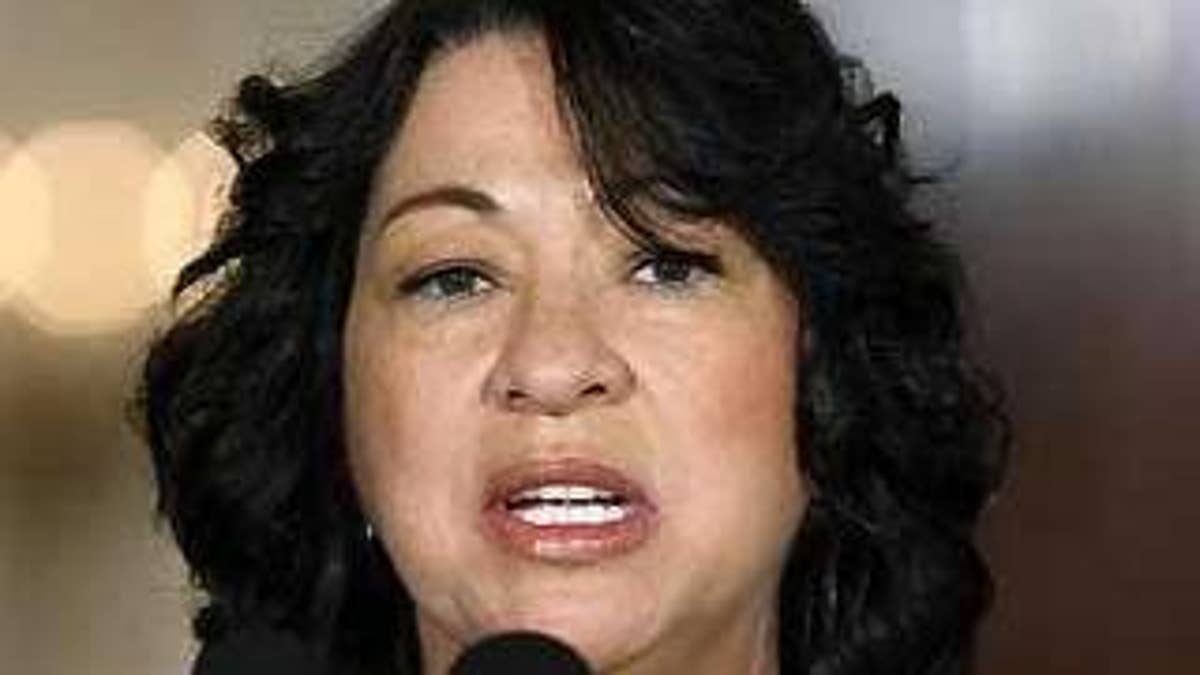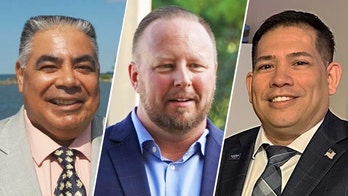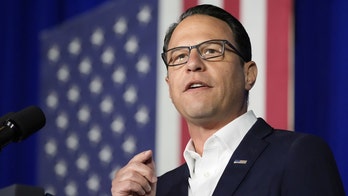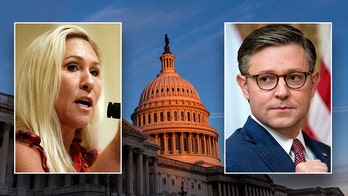
Sonia Sotomayor's Senate confirmation begins Tuesday.
Not her formal hearing, that will be held later in the summer. Rather, President Obama's selection to the Supreme Court will start the more informal but important private meetings with the senators who will ultimately vote on her confirmation.
On Tuesday, Sotomayor is expected to visit top senators, including Majority Leader Harry Reid, D-Nev.; Minority Leader Mitch McConnell, R-Ky.; Sen. Patrick Leahy, D-Vt., the chairman of the Judiciary Committee, and Sen. Jeff Sessions of Alabama, the panel's top Republican.
In some pre-game movement, Sotomayor met at the White House on Monday with administration lawyers who are working on her confirmation. White House aides said Sotomayor was finalizing the answers to her Senate questionnaire and getting ready for the meetings with senators.
Constitutional interpretation, judicial temperament and gay rights are all areas of inquiry sure to come up in these closed doors meetings. It's also possible she will be asked about a controversial comment she made related to Justice Clarence Thomas.
But these are all matters Sotomayor has already answered in front of the Senate Judiciary Committee, which will conduct her confirmation hearing this summer.
She has twice before survived Senate scrutiny. Sotomayor was approved as a federal trial judge in 1992 and faced the committee again when she was elevated to her current post on the Second Circuit Court of Appeals in New York in 1997.
That second confirmation hearing offers a preview of what we can expect when she appears before the committee later this year.
The spotlight will also shine on two men who figured prominently in Sotomayor's last go around: Leahy and Sessions, who just recently ascended to the top Republican seat on the panel.
The duo are seasoned warriors with battle scars from scores of confirmation battles but their handling of this nomination, from a new president almost assured of at least one more high court selection, will almost certainly lay a new foundation for the level of inquiry that is expected for a Supreme Court nominee.
The 1997 Confirmation Hearing
At Sotomayor's Sept. 30, 1997, confirmation hearing, Sessions directed pointed questions toward the New York native and asked if the Constitution should be bent to "feel our contemporary feelings of the moment." She said she would "absolutely" enforce the Constitution even if she did not agree with it and that under no circumstances should it bend.
"It says what it says. We should do honor to it," Sotomayor testified.
Sotomayor also said that interpreting the Constitution means that you look at "what it meant at the time," and that to determine what the document means today one should ascertain "what did it mean then and how to apply new facts to that if the issue is new facts."
Sessions, who himself was blocked by the Senate for a federal judgeship, expressed concern over Sotomayor's temperament as a judge. He pointed to comments she made from the bench at a sentencing hearing when she personally disagreed with the sentence she was about to hand down.
Sotomayor called it an "abomination" and called on Congress and President Clinton to change the sentencing guidelines. Sessions used the case to admonish Sotomayor. He said a judge "has to be careful in conducting themselves in a way that reflects respect for the law and the system."
Sotomayor's judicial temperament was also the subject of a widely-discussed New Republic article published shortly before her nomination. The article, criticized by liberals for its reliance on anonymous quotes, described Sotomayor as a "bully" on the bench and "domineering" during oral arguments.
Former Sen. John Ashcroft, R-Mo., questioned Sotomayor about gay rights, in particular this quote of hers: "The only constitutional right that homosexuals have is the same constitutional right every citizen of the United States has, which is not to have government action taken against them arbitrarily and capriciously."
Ashcroft pressed Sotomayor about her thoughts on making a special constitutional right. She responded that the Constitution should be amended sparingly and only with much thought. "I do not think that we should be making constitutional rights any greater than they exist right now," Sotomayor said.
Refusing to Stand for Thomas?
Sotomayor's ascension to the federal trial bench came less than a year after the nasty fight over Clarence Thomas's nomination to the Supreme Court. In September 1992, while still waiting to take her oath of office, Sotomayor attended a judicial conference where Justice Thomas made his first public comments since joining the high court.
By one account, Thomas was received "politely, if not cordially" by the group of lawyers and judges and in attendance. When Thomas was introduced, most in the audience stood and applauded, but not everyone.
Two weeks later, The New York Times profiled Sotomayor and asked if she was "among those who sat on her hands rather than give him a standing ovation?"
"I'll take the Fifth," she said.
At her 1997 confirmation hearing for the appellate court, Sessions asked Sotomayor about the quote and her actions that day. She said her response to the reporter was designed to keep her away from entering the "political fray" with a politically charged question.
She said that as a judge she "should never be making political statements to the press or anyone else."
After some give and take, Sessions asked if she stood for Thomas.
"He was my Supreme Court Justice of my circuit. I stood up," Sotomayor responded.
The Yearlong Wait
It would take the Senate Judiciary Committee more than five months to move Sotomayor's nomination along. The majority Republican committee eventually approved her 16-2.
But as 1998 rolled on, Sotomayor's nomination languished. It was rumored that she was on President Clinton's "short list" for a Supreme Court nod. Senate Republicans, in control of bringing her name to the floor for a vote, were supposedly holding it up out of concern that Sotomayor's time on the Second Circuit would be short-lived, and a delay would preempt Clinton's plans.
As the months dragged on, Leahy became incensed and blamed Republican leaders. "Their reasons are stupid at best and cowardly at worst," Leahy said that summer.
As it turned out, Clinton would make no more appointments to the high court, and in October 1998, more than a year after her confirmation hearing, the Senate approved Sotomayor's elevation to the Second Circuit 67-25. Despite voting her out of committee, Sessions voted against her final approval.
On the day she passed, Leahy took to the Senate floor and said Sotomayor "followed the law" and that her record would show that "there is no basis for a charge that she is or will be a judicial activist."
The weeks ahead will undoubtedly give Leahy's colleagues ample time to assess Leahy's assertion and then pass judgment on Sotomayor's qualifications to sit on the Supreme Court.
The Associated Press contributed to this report.




